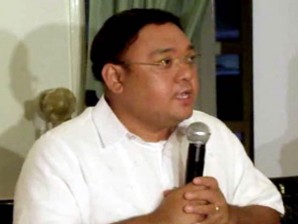MANILA, Philippines—A Quezon City court has dismissed an indirect contempt complaint against private prosecutor Harry Roque Jr. lodged by Andal Ampatuan Jr. for a 2010 History Channel interview on the 2009 Maguindanao massacre.
Judge Jose Paneda of Regional Trial Court Branch 220 said in his decision released on Thursday that Roque’s statements in the interview were not contemptuous, and that there was nothing in the statements that would indicate that Andal Jr., one of 195 people accused of 38 counts of murder in the massacre case, was the one being referred to.
“It is inconceivable how petitioner (Andal Jr.) can claim that said statements were pertaining to him,” the judge said in his 12-page decision dated March 11.
Primary accused Andal Jr. lodged the contempt case against Roque, who represents the kin of mediamen killed in the carnage, for a September 26, 2010 interview that Roque gave on the History Channel.
Members of the Ampatuan clan led by Andal Jr. are among 195 charged with the killing of 58 people, including 32 mediamen, on Nov. 23, 2009 in Ampatuan town in Maguindanao.
The trial of the Maguindanao massacre case is being conducted in the courtroom next to Paneda’s, Regional Trial Court Branch 221 presided by Judge Jocelyn Solis-Reyes.
Andal Jr. accused the private prosecutor of violating the sub-judice rule and committing indirect contempt when he made comments delving into the merits of the case.
In particular, Roque supposedly was referring to members of the Ampatuan clan when he referred to the killers simply as “they.”
Judge Paneda pointed out, however, that Andal Jr. failed to prove that the interview had given rise to a “clear and present danger” to the ongoing trial of the Maguindanao massacre case, and that he failed to show that the comments would “impede, obstruct or degrade the administration of justice.”
“Under the clear and present danger test, petitioner failed to prove that there exists a substantive evil which is extremely serious and that the degree of its imminence is so exceptionally high as to warrant punishment for contempt,” Paneda added.
Court records showed that a technician at the Fortun and Narvasa law firm, which represents Andal Jr., recorded the History Channel episode. During cross-examination, the technician said Roque did not specifically name anyone in the Ampatuan clan as a massacre suspect and that the copy of the video was unauthenticated by History Channel.
The court noted that lawyers occupy an integral role in the administration of justice, which means rules and regulations are imposed on their conduct.
“However, freedom of expression is also secured to them; in this jurisdiction they, like all the others, are given the right to comment on the administration of justice provided their criticisms do not border on disrespect to the authority of the court,” Paneda added.
Roque also faces two other indirect contempt complaints in other Quezon City courts, one filed by clan patriarch Andal Ampatuan Sr. and a Datukan Malang Salibo.
Sought for comment, lawyer Romel Bagares of the Center for International Law, which defended Roque, said the judge’s ruling on the contempt charge was “an important contribution to the advancement of free expression in the country.”
“This is a big victory for free expression in relation to a celebrated case where the very right to free expression of 32 media workers who perished in the massacre were forever denied them,” he said.
